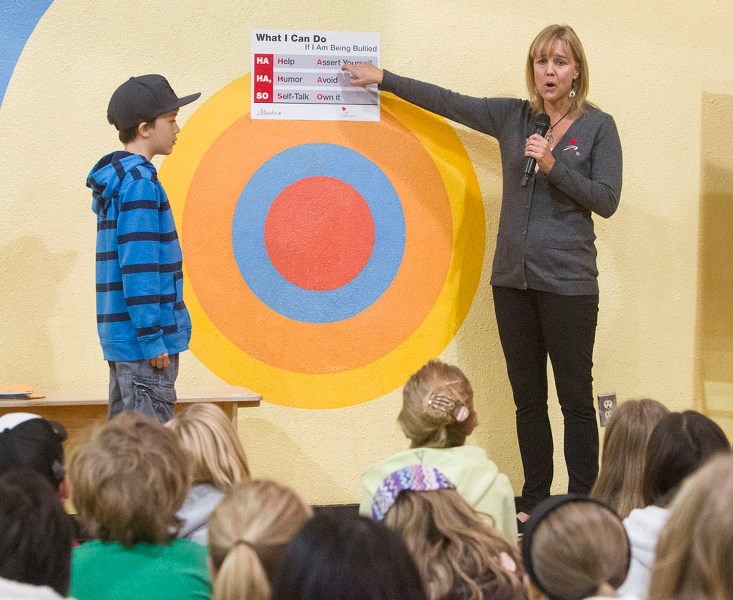Little Sally comes up to you and says Timmy is picking on her again.
Is she being bullied?
Well, that depends, says Lisa Dixon-Wells, founder of the bullying prevention group Dare to Care.
"In our society we're very, very quick to label people as being bullies when in some case it's individuals who just lack social skills," she notes. It's also easy to mistake simple conflict, which is normal and good, for bullying, which is not.
"The word 'bullying' has probably become the most overused word of the decade," she says, adding it is to the detriment of its true victims.
Dixon-Wells spent two days this week working with parents, students and teachers at Leo Nickerson Elementary to teach them how to spot and prevent bullying.
The school last had Dixon-Wells speak about five years ago and wanted a refresher for its new parents and teachers, says vice-principal Helen Nowell.
Bullying defined
Dixon-Wells defines bullying as repetitive, targeted, negative actions directed toward a specific person or group.
"It also has to be intentional," she emphasises – many "bullies" are actually kids who are just really bad at spotting social cues, she notes.
And it has to be repetitive. With children, that usually means behaviour that lasts longer than a week.
About 15 per cent of Canadian students are victims of bullying under this definition, Dixon-Wells told a group of about 20 parents Wednesday night. Maybe two per cent are actual bullies, with a further four being "henchmen," or children who aren't comfortable with being bullies but hang out with them to feel included.
The other 79 per cent are the silent majority who watch bullying happen, she continues. These are the ones who can identify victims and perpetrators, but who rarely report bullying when it happens – just four per cent of all bullying is reported, her research suggests.
"We need to mobilize this 79 per cent."
The parent's role
It's not your job as a parent to punish bullies, Dixon-Wells says – leave that to the teachers.
Instead, it's your job to make your child comfortable enough to tell you about bullying.
"We can't wait for our kids to come to us," she said. Children are very reluctant to speak about bullying out of fear of retaliation or being ostracized as a tattler, and will rarely speak out on their own.
Dixon-Wells encourages parents to share tales of their own experiences with bullying to help their children talk about it.
She also suggests using a "three-minute intervention" where you start broad with questions such as, "What do you think about bullying in St. Albert?" Zoom in and ask, "How about in your class?" Then and come around to asking your child, "Are you being bullied?"
"The best time to do this with your kids if you're really concerned is when you're driving," she adds, as this removes stress-inducing eye-contact.
"If you have to drive to Calgary, do so," she jokes.
If your child says they've been bullied, take it seriously. Just like a CSI detective, you need to investigate and document the specifics of the bullying, especially if it's gone on for more than a week.
That documentation helps teachers confront bullies with evidence, Dixon-Hill explains – without it, all they have is he-said, she-said. Once you've shown teachers this evidence, follow up with regular reports so they can see if their actions in school have worked.
Parents are also the first line of defence against cyber-bullying, almost all of which happens outside of school hours, Dixon-Wells continues.
Just as you wouldn't hand your children the car keys without driving lessons, you shouldn't hand them a smartphone without setting rules and limits. Those include no mobile device use in their rooms and random checks of phone and chat logs.
What's important is to have an open dialogue with your child, she says.
"They're going to be doing things when you're not around, but at least your voice is in their head."




